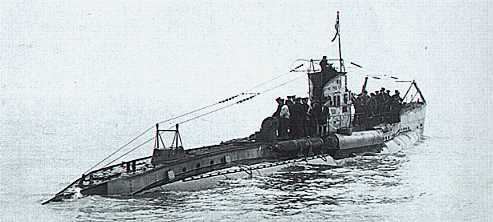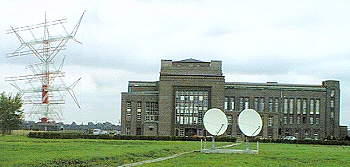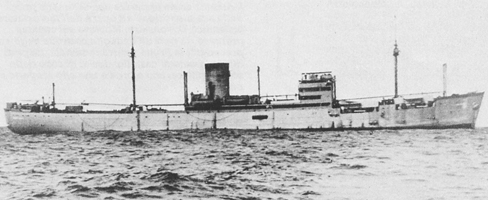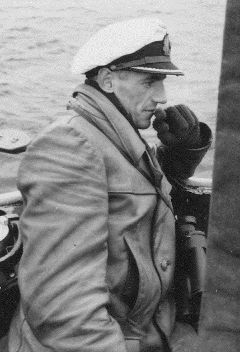Secret Naval Supply System of the German Imperial Navy in WW1
by Robert Derencin
Introduction: Strategic situation immediately before WW1
From the last years of the 19th century until 1914 Germany became strong and powerful European country. But, unlike others European strong and powerful countries (like United Kingdom and France, for example), Germany hadn't numerous and big colonies around the world. Germany had some colonies and territories in Africa, the Far East and in the Pacific, but the colonies and territories were small and hardly defendable in possible future war conflict. On the other hand, geographical position of Germany adversely affected on activities of the German Imperial Navy in possible war in the future. Lastly, Germany had strong merchant marine. In possible war conflict the merchant marine ships wouldn't be able to come back to Germany, because of possible naval blockade of German coast. After some time, because of short supply of fuels (coals), water and food, the ships would have just two options: to surrender or to scuttle (to sink) the ship. Naturally, in such situations the possibility that the ships would be able to serve as auxiliary cruisers (raiders) was out of question.
Because of aforementioned reasons, chiefs of the German Imperial Navy established the Etappendienst (Secret Naval Supply System) in 1911. The Etappendienst was part of German Naval Intelligence and its main mission was collecting information and the supplying of German auxiliary cruisers, merchant marine ships and last but not least submarines.
At the beginning of World War One, in 1914, almost all German colonies and territories were lost (except some of the territories in Africa). Some German merchant marine ships were able to return to Germany, some ships were interned in enemy countries (Great Britain, Australia, Canada etc) and some ships were interned in neutral countries. Submarine warfare became increasingly more important to the German war effort and the Etappendienst changed its primary mission. From that time the most important mission of the Etappendienst became the support of German U-boats, collecting of information (i.e. espionage) and supplying.

The minelaying boat UC 95 of World War One
Methods of work of the Etappendienst
First, the Etappendienst was planned as long-lasting work in enemy environment. Individuals that were selected for the service had to be good under-cover. Also, the individuals had to be placed in the right positions (geographically) and in the right working places. It is clear that the best working places were in harbours and ports all around the world. In those times, as today, the biggest quantity of the world's traffic of people and all sorts of cargoes was made by marine transport. In WW1 navies and merchant marines of involved and neutral countries transported huge quantity of people (soldiers), war materials and other sorts of cargoes.
When one individual collect too many information, it could became suspiciously. In WWI even neutral countries tried to avoid possibilities of actions of foreign intelligence officers in their territories. The neutral countries tried to keep their neutrality and good relations with all the warring nations. Thus, their counter-intelligence officers were keeping a sharp lookout in their ports and harbours during the war.
Because of all mentioned above, the best working places for German agents were in shipping agencies, fishing companies and ports' and harbours' authorities around the world. The individuals that were selected for the service had to be intelligent and had to have adequately knowledge of the matter, enough for working in above mentioned professions and for collecting and distribution of the correct information. Members of the Etappendienst also had to be able to organise supply for German ships and submarines. Sometimes they also organised transport of German agents. It is obviously that the best candidates for the service were naval officers, with some specific characteristics. They had to be able to endure long-lasting period of inactivity in the pre-war period. During the period they just had to get to know the situation in their area of interest and sometimes establish their own espionage networks, if possible.
After the beginning of the war they had to be able to keep their activities on such level in which they could stay undetected. The first task of the agents was to stay undetected and to collect information for as long time as possible. This was better for the service than to arrange sabotages and have agents possibly exposed as a result. Also, agents had to know foreign languages and to be communicative. Finally, even though the agents were mostly naval officers they had to successfully blend in as civilians.
Communications during WWI
Agents of the Etappendienst had to have good communications with their superiors in Germany. An agent could be very successful in collecting information but without the possibility to get that information to their superiors in Germany, their success would be for nothing. The agents were able to communicate on few manners. They could to use diplomatic post, which was difficult during the war, except if they were using diplomatic posts of neutral countries. They also could use ordinary mail, but then there always was possibility that their messages would be detected by censorship of enemy countries. Because of that German agents used invisible inks. But, all above-mentioned methods were too slow for actions that often had to be very quick.
On 5th August 1914 British ship Telconia cut through German transatlantic underwater communication cables, in the North Sea. Because of that, Germany had to communicate with abroad by cables that were under control of the Allies or by radio. Sometimes Germans communicated by means of cables of neutral countries, Sweden for example.
On 3rd August 1914 British Admiralty prohibited the use of wireless telegraphy in ports and harbours of the United Kingdom and the Channel Islands. After entering in any port or after such order, given by any naval, military, examination service, customs or police officer, wire antennae had to be lowered and disconnected from radio equipment. The antennae had to be disconnected while the ship remains in British territorial waters. This order wasn't for ships owned (not chartered) by the Admiralty.
United States enter the war
The United States were neutral in the first part of the war. Even so, in 1914 the US Navy took control of some high-powered radio stations (some of the station were built or were owned by German radio companies). The radio stations were able to make communication with Germany, but under the US navy control. On 6th April 1917 the United States declared war on Germany. The US Navy took control of 53 commercial radio stations. Then 28 of the 53 radio stations were closed. Until the end of the war, all radio traffic from the United States was under control of the US Navy.
It is clear that in Great Britain it wasn't possible that possible for German agents to use radio stations for their activities. On the other hand, possible German agents in the United States had two possibilities to communicate with Germany. They could use normal diplomatic links of the German Embassy (diplomatic post, couriers, and radio communication). Also, the agents could use commercial radio traffic (by means of shore high powered radio stations). The stations were under control of the US navy, but using of ordinary commercial codes was allowed. Usual commercial messages are full of numbers, names, types of cargo, geographical positions etc. The messages could be written ambiguously and after that coded by some of the ordinary commercial codes and then sent to Germany by means of the one of the high-powered radio stations. After the United States declared war on Germany any usual communication with Germany became impossible.
During the war the Allies established their own radio intelligence services for monitoring enemy radio traffic and for code breaking. In the services the code breaking experts tried very successfully to decode enemy radio messages. British WWI radio intelligence service was known as Room 40, because the service was placed in room number 40 in the old building of the Admiralty at first. During the war British also established chain of direction finder stations. The French also had excellent radio intelligence service in WWI but they were too busy because they for the most part monitored the German Army radio traffic, very successfully.
During the war the French service uncovered the location of one German espionage network in the French port Marseilles, on the French Mediterranean coast. The German agents were sending to German Navy Command in Berlin information about the allied ships' and convoys' routes and times of the ships' and the convoy's departures from Marseilles. After that, German Navy Command sent the information and orders, by high-powered German radio station "Nauen", to German U-boats operating in the Mediterranean. Co-operation between the agents in Marseilles, the German Navy Command in Berlin and the German submarines in the Mediterranean was excellent. Finally, the German agents were uncovered and captured. British and French worked together on monitoring of German diplomatic messages from Madrid (Spain) to Berlin and vice versa. Significance of this monitoring will be explained in the next chapter in which will explain work of one well-known German agent in Spain.
The first United States code breaking service was inside the State Department. The service experts monitored German messages that were sent by radio or by ordinary post. They tried to find suspicious text in the plain letters and to find presence of invisible inks in the letters. If they found a coded message they tried to decode it. During the war Military Intelligence Division (MI-8) was established. Its role was military code breaking section for US Army.
German agents had to have possibility to communicate with Germany by radio. Perhaps some of the agents had their own radio stations (and wireless telegraphy operators). But, radio equipment of that time was massive with long wire antennae. Also, the radio stations needed a good power supply. If an illegal radio station was placed near port or harbour or near naval base there always was the possibility that transmitting could be detected by a radio station in the vicinity. Transmissions by the illegal high-powered radio station could hamper transmitting of radio stations, naval or merchant marine, in the vicinity. It is most likely that the agents used existing high-powered radio stations for communications with Germany.
In the pre-war period the German company Telefunken constructed and maintained many high-powered wireless telegraphy radio stations all around the world. For example, the company maintained high-powered radio stations in Argentina, Brazil, China (in Shanghai Telefunken Co. even was owner of the station), Cuba, Mexico, Morocco (in Ceuta), Norway, Peru, Portugal, Spain (three stations), Sweden and Uruguay. Some of the stations were for government use only, but the others were intended for public service. After the stations were established engineers and technicians of the Telefunken Company probably stayed there as maintaining experts and even as wireless telegraphy operators. Local governments or postal services owned most of the stations, but total control of the German engineers and technicians wasn't possible, because they had good technical knowledge and because (if they were members of the Etappendienst) they were well educated for under-cover work. They probably communicated with the high-powered German radio station Nauen. It is known that Germans communicated with their ships and U-boats that were positioned all around the world by the radio station Nauen.

German radio station Nauen, west of Berlin
In 1920 at Nauen a new transmitter building was constructed at Neuen and from 1940 it also served as a broadcast station.
Activities of one German agent in Spain
Between 30th November 1915 and 20 October 1916 one young German naval officer was member of the Etappendienst in Spain. His name was Wilhelm Canaris. He was the perfect candidate for the service; having naval and under-cover work experience and fluency of several languages. Wilhelm Canaris collected information, which were interesting for operations of German U-boats in the Mediterranean Sea. He worked mostly in port of Cartagena on the Spanish Mediterranean coast. The information (times of ships' departures and arrivals, the ships' routes, type of the cargoes etc) Canaris collected from supervisors and foremen in the port of Cartagena. During the war at least one German U-boat was observed during its fuel supply in the port of Cartagena. It is possible that Cartagena wasn't vital just as a source of information but also as a place for German U-boat supplying. During his service in Spain Canaris wasn't member of the German embassy in Madrid. He never had any diplomatic immunity.
Canaris had minimum contacts with officials of the German embassy in Madrid. It is mentioned in this article that British and French intelligence officers were monitoring diplomatic communications (by radio) between German Embassy in Madrid and Berlin. The Allies succeeded to break German diplomatic codes. In the German messages the Allies found information that Canaris was going to leave Spain and come back to Germany via France. After some problems that happen during his travel Canaris had to come back to Spain. Finally, the German U-boat U 35 under command of Kapitänleutnant Arnauld de la Periere, the ace of aces, was sent to Cartagena to pick up Canaris and other two German agents.
The Allied intelligence officers intercepted messages that contained details about the submarine mission and unsuccessfully tried to catch Canaris and the other agents in Cartagena. Canaris and two other German agents firstly found shelter on one interned German merchant marine steam ship that was interned in Cartagena. After that, the agents left the ship and got onboard a Spanish fishing boat. From the fishing boat the agents passed on the German U-boat and continued their travel to Germany.
It is significantly that the allied intelligence officers were able to monitor German diplomatic radio traffic, but they didn't know the details of Canaris' usual activities. They just knew details about Canaris' travel to Germany. It is obviously that Canaris usually communicated with Germany by means of his personal radio station or by means of one of the Spanish shore radio stations. Details about his mission in Spain remained uncovered because he didn't send collected information to Germany by means of radio station of the German embassy in Madrid. It is also significantly that Canaris used interned German merchant marine (i.e. cargo) ship in Cartagena for his activities. The ship was good shelter for the German agents, but such positioned ship could be also used as supply dump of fuel, food and other material for German U-boats. Finally, during the escape Canaris used Spanish fishing boats. Probably, Canaris was using the fishing boats all the time during his mission in Spain.
Etappendienst returns
In WWI the allied intelligence and counter intelligence services did an excellent job. Many German intelligence agents were detected and captured. The allied radio intelligence services also did an excellent job. They succeeded to detect almost all German radio communication, military, diplomatic etc. Most of the German codes were decoded. The existence of the Etappendienst however remained unknown.
Obviously, German naval chiefs' idea to establish service like the Etappendienst was smart and foresighted. The Etappendienst was part of German naval intelligence but with its own organisation, agents, communication system etc. Members of the Etappendienst were trained to be independent and to work without any help inside of the service and as a result of this the service remained undetected by the Allies.
In spite of that, in 1918 Germany lost the war. Many agents of the Etappendienst came back to Germany but many others stayed abroad and continued to work in their legal professions in harbours, shipping agencies, shipping companies etc.
One agent, Wilhelm Canaris, came back to Germany and continued his career in the German Navy. Until 1935 Canaris was serving in different positions; on German ships and at naval staffs. But, even it was forbidden to Germany to re-establish any military intelligence services; Canaris was a few times involved in some suspicious activities. Most of the activities were taken in order to insure money for German intelligence activities in foreign countries. In 1927 Canaris re-established the Etappendienst. Canaris found his old colleagues and friends from the war and he also recruited some new agents all around the world. The service "slept" until 10 Aug 1939 when it was reactivated on the eve of war.
The agents remained inactive until the beginning of WWII, in 1939. Strategic situation for the German Navy then was similar with the situation in WWI. Many merchant marine ships were captured; some of the ships succeeded to come back to Germany and many merchant marine ships were interned in ports and harbours of neutral countries. In the first part of the war German naval ships and auxiliary cruisers made some successful actions but sooner or later the ships were destroyed or captured. But, especially for the German auxiliary cruisers (Hilfskreuzer), the Etappendienst was vital to their very successful activities (in both wars). And like in WWI, as the time passed, U-boat warfare became more and more important to Germany.

Hilfskreuzer Atlantis, one of the successes of the Etappendienst
Photo courtesy of John Asmussen of www.bismarck-class.dk.
The Etappendienst was an important part for the German U-boat warfare. German U-boats in the Atlantic, in the Mediterranean Sea and even in the Indian Ocean depended on good information and supplying and most of that was made by means of the Etappendienst. For example, interned German merchant marine cargo ships in Spain were used as supply dump for German submarines. The Etappendienst most likely did its job in WWII in a similar way as in WWI, with some improvements like in radio communications. The Etappendienst was probably the best German intelligence service in both wars (WWI and WWII).
Germany lost the war again. This time, defeat was complete. The Allies finally uncovered existence of the Etappendienst, but many details about the service remained uncovered until now. An example of this is financing. The German agents needed a lot of money for their activities. Maybe the money was constantly sent from Germany to agents, but it is not quite possible. First, such transfers weren't simple in wartime. Secondly (and much more important) money transfers could expose activity of an agent, no matter how good he (or she) was. It is more likely that the agents received some amount of money before they left Germany. Once when they came to their destination they had to find way how to make money for self-financing. The best way for that was to start some kind of own business, like shipping agency, trading company or something like that.
Another mystery is Wilhelm Canaris. He was an important and a very successful member of the service. As a result of his excellent work in Spain, German U-boats in the Mediterranean succeeded to destroy a lot of the allied and neutral ships. After some time Canaris became submarine commander in the Mediterranean. There was great possibility for Canaris to be captured. Why did the German Navy allow that possibility? Canaris was experienced naval intelligence officer and he had a lot of vital information. Maybe he wasn't just "ordinary" submarine commander. The Mediterranean war theatre in WWI was very important.
Canaris was commander of UC-27 (type "UC II", UC coastal minelayers class submarine), U-34 (type "U-31", middle-class submarine) and UB-128 (type "UB III", UB coastal torpedo attack boats class). Different types for different tasks? Canaris was successful submarine commander but he was also "born agent". It is possible that Canaris, as a member of the German Mediterranean submarine flotilla, continued to work for the Etappendienst, at least occasionally. The Mediterranean war theatre was important but also complex and the Germans needed person like Canaris for he was sailor, intelligence officer and fluent in many languages.
For more on Admiral Wilhelm Canaris visit our career page for him.
Naval communications today
Marine and naval technology has changed from days of WWI. But some things have remained until now. Marine transport is still the biggest and the most important kind of transport of the world. Ships transport the biggest part of all transported cargoes. The biggest parts of the world population live in littoral areas. Control of seas, oceans and littoral areas today is more important than ever.
This article was published on 2 Apr 2005.

